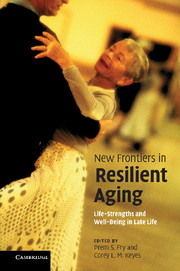Book contents
- Frontmatter
- Contents
- Figures
- Notes on contributors
- Foreword
- Acknowledgments
- Introduction
- 1 Sources of human life-strengths, resilience, and health
- 2 Growth is not just for the young: growth narratives, eudaimonic resilience, and the aging self
- 3 Physical resilience and aging:
- 4 You can teach an old dog new tricks:
- 5 Resilience in the face of cognitive aging:
- 6 Why do some people thrive while others succumb to disease and stagnation?
- 7 Psychosocial resources as predictors of resilience and healthy longevity of older widows
- 8 Resilience and longevity:
- 9 The socioemotional basis of resilience in later life
- 10 Emotional resilience and beyond:
- 11 Risk, resilience, and life-course fit:
- 12 Resilience in mobility in the context of chronic disease and aging:
- 13 Positive aging:
- Index
- References
5 - Resilience in the face of cognitive aging:
experience, adaptation, and compensation
Published online by Cambridge University Press: 06 December 2010
- Frontmatter
- Contents
- Figures
- Notes on contributors
- Foreword
- Acknowledgments
- Introduction
- 1 Sources of human life-strengths, resilience, and health
- 2 Growth is not just for the young: growth narratives, eudaimonic resilience, and the aging self
- 3 Physical resilience and aging:
- 4 You can teach an old dog new tricks:
- 5 Resilience in the face of cognitive aging:
- 6 Why do some people thrive while others succumb to disease and stagnation?
- 7 Psychosocial resources as predictors of resilience and healthy longevity of older widows
- 8 Resilience and longevity:
- 9 The socioemotional basis of resilience in later life
- 10 Emotional resilience and beyond:
- 11 Risk, resilience, and life-course fit:
- 12 Resilience in mobility in the context of chronic disease and aging:
- 13 Positive aging:
- Index
- References
Summary
Abstract
We articulate a lifespan developmental perspective on gains and losses in cognitive functioning during adulthood. This perspective argues that older adults function effectively in ways that preserve goal attainment in cognitively demanding situations despite age-related cognitive decline. Moreover, because individuals grow and age in self-selected contexts, they can successfully use expertise and knowledge, practiced routines of behavior, and reliance on sources of support in their environment to maximize their functional capacity. Metacognitive self-regulation and an active lifestyle can be important means for older adults to preserve cognitive capacity and to effectively compensate for declines in cognitive mechanisms as they occur.
Introduction
A chapter on cognitive resilience should probably start with a definition about it. Is it to think as fast as one did in younger years? Does it involve being as bright and sharp as possible, despite advancing age? Is it about recovering from strokes or other age-related insults to the brain? Is it manifested by showing no signs of decline in all or most cognitive abilities? Or is it about maintaining an active mind until old age? Does it concern keeping one's functional autonomy through preserving the ability to manage one's own affairs in everyday life? Proposing such a definition is not a trivial task, and it requires some insight into theoretical background and ongoing discussions. We begin by treating some core theoretical issues before coming back to propose a definition of cognitive resilience, framed within an important theoretical perspective on development and growth from lifespan developmental psychology.
- Type
- Chapter
- Information
- New Frontiers in Resilient AgingLife-Strengths and Well-Being in Late Life, pp. 130 - 161Publisher: Cambridge University PressPrint publication year: 2010
References
- 7
- Cited by



